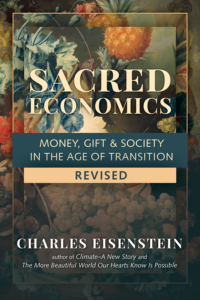Climate — A New Story
Chapters
Chapter10: Money and Debt
Elements of an Ecological Economy
My 2011 book, Sacred Economics, attempted to describe what a steady-state or degrowth financial system might look like, and how we could realistically transition into it. Its main pillars were: negative-interest money creation, universal basic income, internalization of ecological costs, economic relocalization, and, animating all of these, the recovery of the spirit of the gift as the basis of human economy, creativity, and livelihood. In retrospect I have doubts about the title of the book, which, although true to its content, put it outside the notice of most practicing economists and policymakers. Happily, many of the ideas I wrote about are ideas whose time has come. The age of growth is ending despite our every attempt to maintain it; social and ecological limits press in on the economic system and it creaks under the strain. As its demise comes into view, as the insolubility of the crisis becomes obvious, ideas that once seemed fanciful are filtering into the mainstream. I will mention a few in brief that I explored in depth in Sacred Economics that have particular relevance to ecological healing.
Debt Cancellation. As I have described, the global debt regime is a core driver of environmental destruction. Although it seems like an unalterable aspect of reality, debt (like money itself) is a social construct, only as real as the laws and agreements that enforce it. Laws can be changed. Agreements can be repudiated. In the end, debt depends on political power.
In principle, the central banks of the world could simply purchase and annul all student loan debt, consumer debt, mortgage debt, and sovereign debt, because central banks (like the Federal Reserve) have the power to create essentially unlimited amounts of money. They could also partially cancel those debts or reduce the interest rate to zero. They lack the political mandate to do so, but we must recognize that the current debt regime is not an unchangeable part of physical reality. It is in our power to change. We do not need to be stuck in a usurious world. In the last ten years we have seen a series of bailouts that were actually “creditors’ bailouts,” designed to keep the debtors owing. We could change course and meet the next crisis—coming soon!—with a debtors’ bailout instead.
A debt resistance movement is growing worldwide that recognizes the unjust origins and onerous effects of much debt today. A debt strike (refusal to make payments on debt) by an organized minority of debtors (individuals and nations) would quickly bring the system to its knees, since it is already so highly leveraged. Given the role of debt in driving the world-destroying machine, movements like the debt jubilee are also forms of ecological activism.[3]
Negative-Interest Money. An interest-based system is profoundly unecological. It attaches a world that is cyclic to a token of value that grows exponentially. It values the present over the future by encouraging the discounting of future cash flows. It requires endless growth in a world that is finite. These are among the reasons to investigate a system that reverses the effects of interest.
The way to apply this idea is through a liquidity fee on bank reserves. Basically that means if a bank keeps excess reserves and doesn’t lend them, those reserves shrink by a rate of perhaps 5 percent a year.[4]
In that context, banks would have an incentive to lend at zero interest or even less. Lending would no longer depend on aggregate economic growth. A break-even business that would never have to expand its revenues to meet interest payments would be a viable investment. The realm of paid goods and services would not need to constantly expand. The money system would no longer drive the conversion of nature into property and product. Conservation would no longer be wading upstream against the current of financial logic.
A negative-interest money system
- Allows money to circulate in the absence of growth
- Reverses the concentration of wealth that the present system encourages
- Shifts taxation away from income and sales, toward money itself (and other rent-generating property such as land)
- Offers debt relief without bringing down the whole system and ruining small savers
- Aligns money with the spiritual principle of impermanence and the ecological law of return
- Reverses the discounting of future cash flows, discouraging the liquidation of irreplaceable natural capital
The reader will have many questions. How will banks make money? Would it cause inflation? What is to stop speculative bubbles as people flee cash for commodities? Wouldn’t it encourage overconsumption? Most of these are addressed in chapter 12 of Sacred Economics, which describes the history, theory, and application of negative-interest currency in detail.
I mention the idea here to hint at an alternative to the usual polemics around “capitalism,” which is the usual culprit in a Left analysis of the environmental crisis. But as in so many debates including climate, the polemics obscure deeper assumptions shared by both sides. The nature of capitalism depends on the nature of capital. And the nature of capital—in particular, who owns it and what they can do with it—depends on social agreements that are not black and white, but admit many shades and variations. Negative interest turns capitalism upside down.
Socialism is usually defined as “public ownership of the means of production,” but what is ownership? It is never an absolute subjugation of object to subject, as the Story of Separation would have us think. It always rests on a social arrangement. The objects themselves, the land, the water, the minerals, the trees, do not themselves admit to being owned. Even the most stalwart Libertarian doesn’t think that owning something confers the right to use it to harm others. The rights of property are always socially circumscribed. The question then is: as our understanding of what harms the other evolves, what is the appropriate social agreement about who can use what for what purpose?
Activists, we will never get very far by pinning hope on inciting the public to tear down capitalism. Nor will we get very far by leaving the current system of capitalism intact. We must alter its foundations, the basic perceptions and agreements that define the categories of money and property. Even the word “mine” seems obsolete, as we begin to understand ourselves as interbeings, and as we begin to see the objects of ownership as subjects themselves. Today, we know it is wrong to own a human being—slavery is only thinkable if we dehumanize the slave. Now it is starting to seem similarly wrong to own land. We can be its steward, its caretaker, its partner, its ally, even its servant … but its owner? How dare we?
The challenge is how to translate that understanding into our economic system. Many of us want to live more humbly and respectfully. We don’t want to profit off the suffering of the other. This rising consciousness is misaligned with the current system of money and property. Negative-interest money is a step toward realigning economy and ecology.
Internalization of Ecological Costs. Today it is quite obvious that money is usually the enemy of sustainability. There is a lot of money to be made by extracting resources, clearing forests, depleting oceans, and emitting pollution. At present, there is little to be made by greening deserts, restoring wetlands, protecting habitats, or avoiding pollution. That means that government policies—and our own good intentions—must fight the money power in order to maintain a livable world that honors life.
Is this a necessary state of affairs? Does it reflect an eternal battle between altruism and selfishness, between spirit and matter, good and evil, God and Mammon? Some economists think it need not be this way, if only it were possible to make environmentally destructive activities very expensive and restorative activities remunerative. The idea is that pollution, deforestation, and so forth are a form of stealing from society, nature, and future generations. No one should be allowed to profit by externalizing costs onto someone else. Green taxes and cap-and-trade schemes for pollution rights seek to internalize these costs and align the best business decision with the best ecological decision. On the restorative side, the concept of “valuing ecosystem services” seeks to pay people to preserve land, plant forests, protect watersheds, and so on.
I have already criticized this idea on both theoretical and practical grounds, especially when it comes to reducing ecological health to a single monetized metric of carbon equivalents. We can measure only what we can see, so anything outside our cultural blinders will escape our accounting. Moreover, we unwittingly import our invisible biases into our choice of what to measure and how to measure, biases that tend to be aligned with the financial interest of the institutions and systems that apply them. What is visible to us in the civilized world? Tons of CO2. Hectares of forest cover. Concentrations of ground-level ozone. Acidity of oceans. Numbers of species. In the service of these measurable things, we are willing to sacrifice what is invisible or unimportant to our eyes: generations-old social practices that allow traditional people to coexist with the land; the integrity of sacred sites; complex ecological dependencies that we have not yet learned to see or measure.
On the other hand, clearly we cannot persist in upholding a system in which profit and ecology are opposed. Can we fix the concept of ecosystem services? In fact, some of the programs justified by the concept of ecosystem services have been successful, and we should not dismiss these successes on dogmatic grounds. Farmers in Bolivia are paid to protect their watersheds, and loggers are paid to cease clear-cutting. Cap-and-trade systems for sulfur dioxide have curtailed acid rain. Learning from the failures (such as the dismal results of carbon credit trading) and carrying forth the successes, we might develop more and better ways to align money with ecology. For example:
- We can eliminate hidden subsidies that make local and ecological practices uneconomic. This is certainly the most important measure, because so many unsustainable practices are viable only because of public subsidies. Long-distance trucking companies, for example, don’t pay to build and maintain the highways. This cost is borne by the public. Nor do oil companies bear the costs of imperial oil wars.
- We can use quota systems, green taxes, or auctions to limit renewable resource use to the amount that can be sustainably replenished.
- We can do the same to limit waste emissions to a rate that the rest of nature can process.
- We can also pay countries like the Democratic Republic of the Congo, Ecuador, and Brazil to preserve their rainforests, setting that amount at a level sufficient to offset the profits that would otherwise accrue from liquidating those resources.
- We can pay farmers to practice regenerative agriculture.
- We can cancel Third World debt in recognition that much of it was incurred for the purpose of extracting resources whose environmental costs were never compensated.
The organizing principle here is not to totalize economic logic. It is that people and nations should be able to make as much money from the alternatives to extraction (past a sustainable level) as they do from extraction itself. It would be hypocritical otherwise: to say, “Don’t cut down those trees—but I’ll only pay you if you do.” Money, after all, is an expression of what society values. As what we value shifts toward ecological healing, we need to change the economic system to reflect that.
We should not pretend, though, that the financial incentives we assign toward environmentally desirable outcomes can truly represent the value of the land, water, biodiversity, etc. It is surely a good thing to align money with ecology, but we must do that without reducing ecology to money, nature to commodity, the infinite to the finite, the sacred to the profane, quality to quantity, and the world into a pile of instrumental stuff. Detaching financial incentives from the doctrine of value frees us to apply them flexibly on a case-by-case basis that fully recognizes their social context.
Universal Basic Income. At first glance, the notion of a guaranteed income for all might seem to promote consumption rather than sustainability. Actually, it could liberate people from compulsory participation in the extractive economy and free them up to serve as healers, artists, peace workers, and ecological stewards.
Universal basic income draws intense criticism from both the right and the left. The right says that without being forced to work for a living, most people would cease to contribute to society. Who would drive the buses, wash the dishes, and clean the toilets? The Marxist left says that UBI preserves the basic structure of capitalism (private ownership of the means of production); at best it would blunt the edge of capitalism’s worst excesses.
While a thorough exposition of the arguments for and against UBI is far beyond the scope of this book, responding to the above-mentioned criticisms will serve to illuminate UBI’s potential. First is the matter of “no incentive to work.” That draws from a particular philosophy of human nature; namely, that humans are driven by rational self-interest, and won’t choose to contribute to something greater than themselves unless bribed or compelled to do so. That means that you, my dear reader, would happily retire to a life of tennis and golf, World of Warcraft and HBO, partying and debauchery, if only you could get away with it. Fortunately, you are compelled to make a living instead.
What I see in the world though is the opposite. It is that people have a compelling desire to contribute meaningfully to the well-being of society and the planet, but that the pressure to earn a living prevents them from doing so. Or they must struggle against economic pressure to do what the world most needs right now. This suggests a malfunction in our economic system, which, ideally, is supposed to encourage precisely those things that serve the world. Instead, it encourages those things that serve the program of growth, domination, and conquest, the Ascent of Humanity. These goals no longer confer meaning and fulfillment to most of the people who serve them.
In a sense then the criticism from the right is accurate. Society as we know it would fall apart if we could no longer bribe and coerce people into performing degrading work. On the soul level, it can be just as degrading to work in high finance as to drive a shuttle bus—maybe even more degrading. In the context of UBI, corporations and entrepreneurs would have a strong incentive to design fulfilling jobs, because they would no longer be able to count on desperate people willing to do practically anything.
As for the Left critique, one might look at UBI as in fact a restoration of the commons to public ownership. The term I used in Sacred Economics for UBI was a “social dividend”—each person’s share in the collective wealth of the world, natural and cultural, to which no person has more of an intrinsic right than anyone else. This view is especially compelling if the UBI is funded through levies on accumulated wealth (e.g., negative interest, Georgist land taxes, etc.), which essentially negate the profits available through mere ownership of resources.
Any debate about capitalism depends on the nature of capital. Both money and property exist by convention. They are stories, systems of meaning and agreement. Stories can be changed. The current Story of Money is part and parcel of the Story of Ascent; it is the foundation of a social system that is devouring the world, a system that converts quality to quantity, nature to commodity, soil into dirt, trees into board feet, and values into value. It is a system that chews up beauty and spits out money. It is the tide against which every environmental cause swims. To change it is no small matter. Money as we know it infiltrates our understanding of who we are and what is real. It cannot change unless everything changes, and when it does change, everything else will change with it. Those who see the climate crisis as a portent of a wholesale transformation of our civilization should understand, then, the necessity of that change reaching to the level of money.
End Notes
[3] For more on the philosophy, economics, and politics of debt resistance, read my article “Don’t Owe. Won’t Pay.” in YES! magazine (Eisenstein, 2015b).
[4] Negative interest can be implemented even more easily in digital currencies, and could mitigate the hoarding and speculation that plague them.






